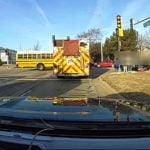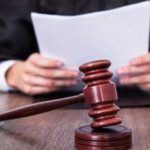Coles Co. (ECWd) –
During a recent Charleston School Board meeting we noticed the local reporter for the newspaper was present. In light of the teacher that had been arrested and questions raised during the meeting, many had hoped the local paper would have reported on it. They didn’t. Our first article after that meeting is found at this link, and in the video, you will see the local reporter sitting in front of the camera to the right.
It turns out a citizen contacted the paper to complain about the lack of reporting on what they believed was an important issue, child safety. Shortly after those complaints, we were contacted by the paper.
The local paper has focused on the shredding of documents and whether they are or are not public records. In the first article, they misquoted my comments. They reported my position to be: “Allen said he interprets the act as indicating that these items are student records.”
At no time did I ever tell them that was my position. I contacted them and asked for a correction to their mistake.
Their response: “I may have gotten confused when I spoke with you. We can look at doing a clarification/correction/follow up, but my editor asked if you can elaborate a bit first.”
Elaborate I did. I shared all my communications with the School Board President, which included the very state laws that support our position. Sadly, no correction was published in the paper. Instead, they ran another story focusing on records with no correction to the previous mistake and once again, they got it wrong. “Watchdogs co-founder Allen has said that he does not believe the photos and questionnaires were student records.”
So now we have two publications with two separate positions, neither correct. First one here, second one here.
The School Code that I provided to the paper, outlines the definition of a Student Record.
105 ILCS 10/2 (d)– “School Student Record” means any writing or other recorded information concerning a student and by which a student may be individually identified, maintained by a school or at its direction or by an employee of a school, regardless of how or where the information is stored. The following shall not be deemed school student records under this Act: writings or other recorded information maintained by an employee of a school or other person at the direction of a school for his or her exclusive use; provided that all such writings and other recorded information are destroyed not later than the student’s graduation or permanent withdrawal from the school;
As confirmed by the School, the photos of the children were done at the direction of the Administration, which would make them a student record. Also confirmed by the School Board President, the questionnaires were NOT at the direction of the school nor maintained by the school. They were maintained by the now arrested teacher. The direction to collect that data from students is key as the second part of the statute would allow for destruction provided the information was maintained by an employee of a school “at the direction of a school for his or her exclusive use”. Since there was no direction, there is no destruction authorization under that statute.
The questionnaires were not a student record as defined in the statute. We contend they were a public record subject to the local records act that requires permission to destroy them.
50 ILCS 205/3 – “Public record” means any book, paper, map, photograph, born-digital electronic material, digitized electronic material, electronic material with a combination of digitized and born-digital material, or other official documentary material, regardless of physical form or characteristics, made, produced, executed or received by any agency or officer pursuant to law or in connection with the transaction of public business and preserved or appropriate for preservation by such agency or officer, or any successor thereof, as evidence of the organization, function, policies, decisions, procedures, or other activities thereof, or because of the informational data contained therein. Library and museum material made or acquired and preserved solely for reference or exhibition purposes, extra copies of documents preserved only for convenience of reference, and stocks of publications and of processed documents are not included within the definition of public record. Paper copies of registration records, as defined in Section 1 of the Library Records Confidentiality Act (75 ILCS 70/1), shall not be considered public records once the information contained in the paper registration records is transferred into a secure electronic format and checked for accuracy. (Source: P.A. 99-147, eff. 1-1-16.)
The records were in connection with a teacher’s transaction of a public business, teaching. They were received by the Administration (agency or officer) after complaints came in. Those materials were in paper form. Every one of those points is prongs defining what is a public record.
50 ILCS 205/4 – (a) Except as otherwise provided in subsection (b) of this Section, all public records made or received by, or under the authority of, or coming into the custody, control or possession of any officer or agency shall not be mutilated, destroyed, transferred, removed or otherwise damaged or disposed of, in whole or in part, except as provided by law. Any person who knowingly, without lawful authority and with the intent to defraud any party, public officer, or entity, alters, destroys, defaces, removes, or conceals any public record commits a Class 4 felony.
After reading the two stories in the paper we felt we not only had to tell the real story in this article but also set the record straight with this current article.
If reporters are not going to do the hard working of fact-checking and ensuring the accuracy of their reporting we will continue to see a decay in print media as well as electronic media as the public simply can no longer trust what it reads. We have an obligation to get it right and when we don’t, correct it with accurate reporting.
Check back for yet another exposure of local media failures as it relates to reporting on the Coles County Sheriff’s election.
.
Our work is funded entirely thru donations and we
ask that you consider donating at the below link.








4 Comments
Danni Smith
Posted at 10:38h, 11 Marchthese medias just continue to make themselves more obsolete every hour of every day. Shocker-even Bernie sanders is calling out cnn. Have to laugh when Patriots and commie Sanders agree.
Kevin duJan
Posted at 09:28h, 11 MarchThis is the same experience that Megan Fox and I had in Orland Park after we discovered that the public library there had covered up child porn being accessed in the building (without police being called!) and other horrible crimes through the years…the media refused to report on that. Megan and I personally handed Evelyn Holmes (ABC) and Necita Kwan (NBC) copies of the documents we found buried in the Library’s incident reports that showed a pattern and practice of Orland Park public employees choosing not to call the police when sexual crimes were happening in the building. It seemed like the staff chose to do that so that no police reports would be written and the events would never make it into the local paper’s police blotter. Neither Holmes or Kwan would report on the child porn being accessed or the open public masturbation that the Library’s own incident reports documented was happening in there. The Tribune, Patch, and OP Prairie reporters would not report on the child porn or masturbation either. Instead, they all wanted to write stories about Megan being an “upset mom” who didn’t like porn in the library. So the media chose to write a story it wanted to write (busybody mom hates boobies!) instead of writing about how public employees were caught not calling the police when things as terrible as child porn accessing and masturbating in front of minors were happening in that place. The reporters largely attacked Megan and me and always took the Library’s side. It felt like the reporters were programmed to always take the government entity’s side and to attack any members of the public who dared to question the public body or expose its wrongdoing. We even caught one reporter, Danielle Braff who wrote at the time for Crain’s Chicago Business, engaging in unethical subterfuge to try to write a hit piece on us to help the Library. She was caught on tape openly saying she wanted to write a hit piece and that tape was played for her managing editor at Crain’s who then killed her story. Megan and I wrote a book about all this (and more) called SHUT UP!: The Bizarre War that One Public Library Waged Against the First Amendment and documented all of the many times over a 3 year period that reporters consistently sided with the Library and acted as agents to carry water for the Library and attack the Library’s critics.
Jannie
Posted at 08:56h, 11 MarchYes, my experience has been similar – during a lawsuit between a public body and a non-profit. Articles gave the public body side – when those public spokespersons were interviewed and told incorrect information; the other side wasn’t interviewed or allowed to speak. . When a letter was written to correct information with facts it was not corrected in the paper. When letters to the editor were written by citizens not connected with the lawsuit, but people with opinoins those letters were never published. Only one side of issues are given – the side the paper chose.
I have, after this experience, taken what is written in newspapers, with a grain of salt – what I believed before that journalists gathered facts and newspapers publish facts — is now they decide what side they are on and publish information that supports that side – if they are presented with facts that contradict who/what they support they will ignore them
Dave
Posted at 19:21h, 10 MarchMy experience with newspapers has taught me they are mostly arrogant power abusers with an agenda. And its not to fairly report the truth or the news